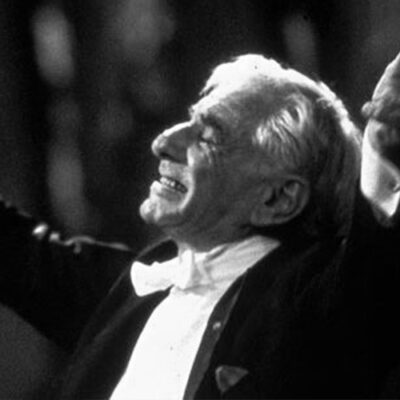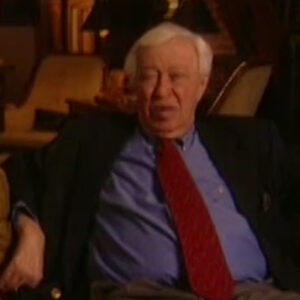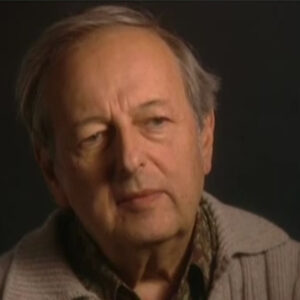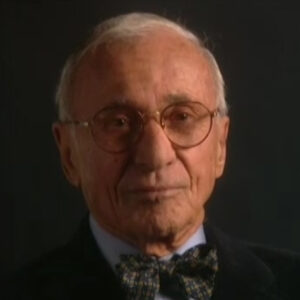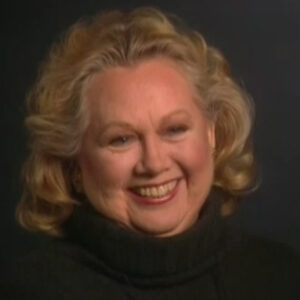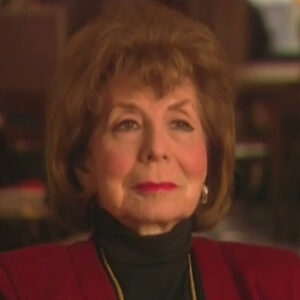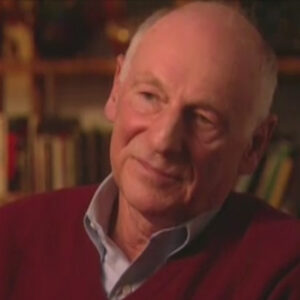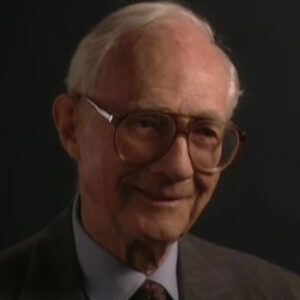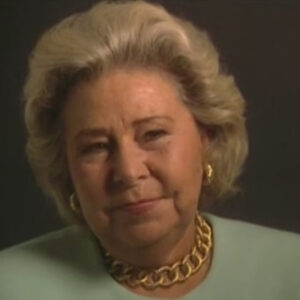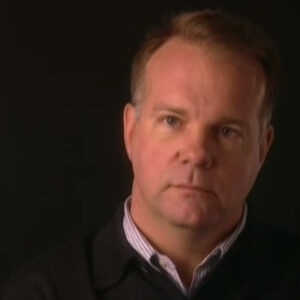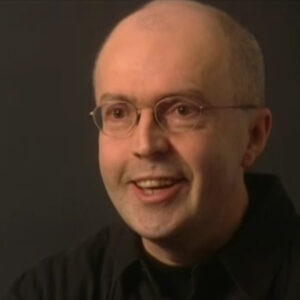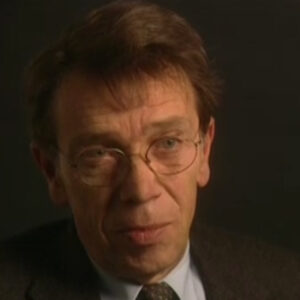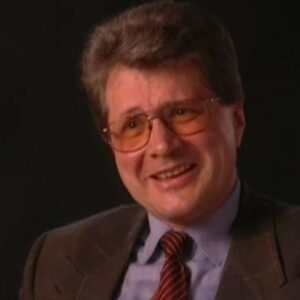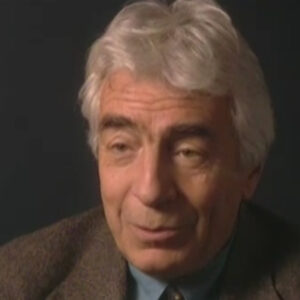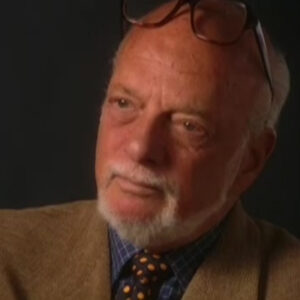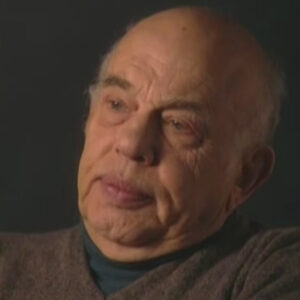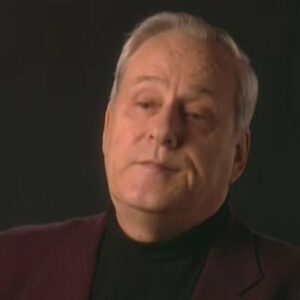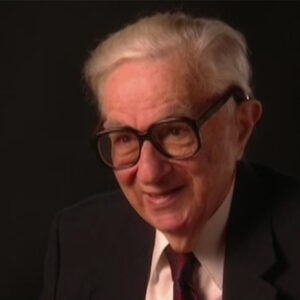Speaker In 1968, I had written a play that was done in California that called Musica, and it came to the attention of Jerry Robbins, who at that time had been given a grant by the National Endowment for the Arts to have a fair experimental theater workshop. And Jerry became aware of my play and asked me if I would come into his workshop as a playwright. And I did. But I watch a lot of actors exercises and I didn’t know quite how I fit into it. And he said, well, here’s a Brecht play, the exception and the rule. And we said we’d like to find an American way to do Brecht. And so that was my task. So I went home and I. Try to figure out a way to do this Brecht play and I in an American way, and I set it within a. A benefit performance of a play, and that would be done for one performance only, and that would be the context of the Brek play. And Jerry was so taken by it that he brought it to Leonard Bernstein to see what Lenny thought about it. And Lenny was very taken by it. And he said that he would do it if Stephen Sondheim would do the lyrics, which.
Speaker This was 1968, I was 30 and it was mind boggling, and I went up to Jeri’s one night to meet Stephen Sondheim and I told Steve Martin we wanted to do it. At the end, Steve said, you know, let’s do it. And then we all met with Lenny. And that was my first meeting with Lenny in Jerry’s house in 1968 to start working on this musical. And I remember coming back after I said to Steve, after I said, Steve, how come? There hasn’t been your team that you and Lenny and Jerry haven’t worked together since West Side Story and Steve that you’ll see and well, I did see because we worked on it for about in 1968 for about nine months and nine to 10 months.
Speaker And Jerry could only work first thing in the morning. He at the crack of dawn, he was ready to work, but Lenny could only work so at midnight and the day was upside down. I mean, the day I would leave about the Jerry’s about 2:00 p.m. and go home and tape and then go to with Steve Telnaes, who would only could play in the dark. And we worked and we worked with Lenny Could Composed in the dark. And it was and then I’d get up right. And try to write in the dark and try to bring a flashlight in the wind. And then it would take all my notes and then I go to Jerry’s at dawn and where it was a crazy time. I just remember all I was able to eat was pizza and several hot dogs off the street and and bourbon. I believe Steve and I became great friends out of it. He was he was the link because I was in the position that he was in West Side Story and Zero Mostel was going to do it. And it was announced and it had an advance is going to play the Broadhurst Theater. And one day during auditions, Jerry excused himself just for a moment to. To just go to the theater, we just got out of the theater by the pastor and the actor who was on stage said, I have a piano, which, you know, I’m waiting, waiting, so I want to see where.
Speaker Had God, if anything was wrong and pop, the guy at the stage door said I said if it was Mr. Roberts, he said, Oh, we just got in a taxi for Kennedy Airport. And I was so happy I realized it was over. And Lenny came and he said, Where’s Jerry? I said, he’s gone to California and it was very Jerry. Lenny was.
Speaker Horrified, I mean, he burst into tears, it had been a very difficult time because we all were following Jerry’s lead on it. Lenny said, I don’t see how I can show, do my best, do my I want to do large size work. I mean, in all the stuff I’m being asked to do is small. Small song is Brechtian angry songs.
Speaker And that he felt did not. Rightfully so, show of what he could do and but we all followed Jerry’s take on it and it was really hard. It was not easy, but we all felt, well, if Jerry being the master and Jerry was the mastermind, Jerry always I think that Jerry Robbins was the only person that Bernstine was afraid of because it had been fancy free, had been Jerry’s idea, and had given Lenny that success. And and on the town had been. Had been Lenny, it had been Jerry’s idea that became Lenny success and West Side Story had been Jerry’s idea and Wonderful Town, which Jerry had directed. So Lenny very much revered. Jerry said when Jerry suddenly walked away from the project, when it was weeks away from going into rehearsal, it was overwhelming for four for Lenny. I felt that I had had I was I was let down tremendously, too, because it was thrilling.
Speaker It was a thrilling time. Was it?
Speaker It’s Lenny’s only posthumous piece. I have to jump ahead.
Speaker That was 1968 that it ended. Now I have to.
Speaker 18 years go by and it’s now 1986 and I was.
Speaker It was intermission at the New York City Ballet, and I said to my wife, Adele, who’s standing behind me. And she said nobody why was very crowded lobby and intermission. And I said, because Jerry Robbins is heading towards me. This we’re looking right this way and. Jerry came up and said, hi, John. I said, hi, Jerry. And he said, you know, I was just reading exception to the rule, the Brecht play the work you did. I haven’t looked at it in 18 years, and it’s just terrific. And Lenny’s work is terrific and Steve’s work is terrific and your work is terrific. And let’s just go back to work on it. Eight years difference, there’s just 18 year blip, so. I I said to Adele after I said, what should I do, we should go back into this nightmare again. She said, these are three things that it can either be as bad as you remember or it can be better than you remember, but it won’t be the same, whatever it is. How many people have a chance to go back into the same situation eight years later? And we did.
Speaker And we had a workshop at Lincoln Center and this time Josh Muscatel, who was zero Sun was cast in the part that there was going to play and we had a six month workshop during that time. Lenny was taking off three months from his conducting to compose and. He was both thrilled and terrified because you have to realize that, Lenny.
Speaker It was a rock star, I mean, in his in his study, there were some, you know, crystal sculptures that only had gone to the Beatles and Lenny and Madonna and Barbra Streisand.
Speaker I mean, if people would sell a billion records, I mean, and Lenny was very used to.
Speaker His every night receiving an ovation. And on that side of of conducting, it was very hard for him to find that quiet place within him, sight withinside himself to to start composing again.
Speaker And it was weird because the work is still Lennie’s only posthumous piece. We did a sort of workshop with Lenny and stop work on it during. He just became impossible for him to physically to work on it. And Michael Barrett, the musical director, brilliantly took a number of Lenny’s themes and used them with Lenny’s approval and Jerry’s approval to allow ourselves to look at the show. And we did a rehearsal, we did we played it for about maybe three or four performances after the six month period, and Lenny came back and was thrilled by it and he said, I want to go back to work on it, but.
Speaker Jerry said no and I said no, we just didn’t want we didn’t want to we couldn’t contain time had just passed it by for us.
Speaker And we’ve been in the workshop. And Lenny, his problems were so great, his personal problem, his pain was so great at that time.
Speaker That it was odd because he would rework certain sections over and over and over, but the key dramatic events he would not touch, he wouldn’t come to terms with the the central event of the play. There was a killing in it. So there are like one moment we’ll have four different versions of it and another important moment will have no music. It’s still. I mean, it was a very but in the differences in that second time, Lenny, what was it also interesting about meeting Lenny in 1968 was that that was the year of his fiftieth birthday and his fiftieth birthday was remarkable. And Lenny was still not even Lenny, but by 19 but eight years later.
Speaker And as it was, it was, you know, he was.
Speaker He was 68 and he was tired. You know, I mean, he was full of vigor, extraordinary energy, but had become sort of monumental and was questioning his life. And we became Steve was working on another show. So I had to go over doing some of the lyrics. And so Lenny and I spent a lot of time together and we would take lot I’d meet him in the house at the Dakota and we would take long walks in the park. And he. Just trying to find that quiet place inside himself told me of all it was because he was very open, very revealing about his life and his fears.
Speaker And, you know, and here is a man who you realize could have had a great career as a concert pianist. As a conductor, as a classical composer or as a Broadway composer, and he had so many gifts showered on him that had he chosen the right one and.
Speaker He was it wasn’t easy being Lenny, I mean, this is a story that I love this story one night, Lenny, we were working, Lenny. So would you have dinner with me tonight? I said, I can’t. I said, I’ve got to go back and work because I’ve got to give this work to Jerry because we’re going into rehearsal, you know, in a week. And I have to get all this stuff down. We said I don’t want to be alone tonight. And he was very alone. It was in a great sense of isolation. And I just can’t be you know, everybody’s out of please have dinner with me. I said I can’t. It’s simple as that is. What am I going to do? I said, look, this is Woody Allen Movie Radio Days, which is playing with 84 Street. And you haven’t seen it yet and you’d really love it. It’s very funny. And it’s you’ll get a kick out of it. It’s your time. It’s your period. So Lenny called me, said, oh, Craig and Craig, Lenny’s a sense of humor. And he said, Would you get Woody Allen on the phone? I said, Why? Well, I think I see the movie. I said, it’s just a before forestry. And Craig came in and he said, Mr. Allen is a star in Switzerland. He said, we’ll get him.
Speaker I said, Lenny. It’s your 22nd. It’s an 84 street. Mr. Allen is on the phone. Hello, Woody Allen. Here, wonderful as Oskay has me and my love. Yes. Well, listen, I want to see radio days. What should I do about it? Craig, on the other line. Yes, I know these are people at Sony to call. Yes, I’ll call that. Thank you so much. All of a sudden, you come back. I love you. Bye bye.
Speaker Hung up and Craig said, you have all the information. And he said, yes. He said, I’d call the head of Sony and we’re arranging a car and will be here at six o’clock.
Speaker I said, Lenny.
Speaker The next morning, I came back and I said so he said, well, he said it was funny that the car came for me and he said we went, but she was already forced. The car took me to Eighty Fourth Street.
Speaker And I went up and I got a ticket and I went in and the theater was empty.
Speaker The people there pooty I said Lenny’s been running for three months. It was a rainy Tuesday at six o’clock. This was Lenny goes to the movies. It was our life was not simple because Lenny was always on display and. And he was remarkable.
Speaker Well, you got to love this go. I can tell you there will be several.
Speaker He said that he was saying at this time, I mean, I gather what happened is that they started off with an enthusiasm for the 18 year gap that New York City Ballet, and then there was enthusiasm to go ahead and let them really just couldn’t work on it. And by the time he was ready to focus on everybody sort of got tired of it.
Speaker That’s right. So that was around.
Speaker There were about three to three or four performances were done at Lincoln Center to which Lenny came and which revived his enthusiasm, having seen it in front of an audience. I believe it’s recorded if it’s recorded by Lincoln Center, I don’t know. But I know that Jerry recorded it that occurred.
Speaker And I actually thought it was an unrealized works. I mean, this is exciting to know that. I mean, that I read that it actually had him at Lincoln Center.
Speaker We are. Next year will be Lenny’s 80th birthday. Michael Barrett. There is some talk I mean, this is off camera, I don’t know, but there’s been some talk of doing a lot of Micarelli preparing a concert version to be done in September 98 just so it can exist in some form now. It does exist. It exists in a it exists in a it exists in a we did present a version of it, an incomplete version.
Speaker And it’s very that if we’d gone on, there are moments that would have been extended. And there was one remarkable melody that it was so. Strange and beautiful that it was written for the show and and I don’t understand, but last year from ASKAP, I get a royalty 15 cents for the Victory Poker, which is a song that Lenny and I had written for this and.
Speaker Victory is just around the corner, why they found it in Russia and why they bother to pay.
Speaker This is a mystery to me, but I had forgotten it until I got that ASKAP report you mentioned at that time when he was in pain, questioned his wife.
Speaker And you said it could have been in any of these things and she’s like, well, the fact is he chose he chose all the roads is what was what was the source of his pain?
Speaker Well, trying to find the composing part of himself again, trying to find the part of himself that had been a composer because he had had you know, he’d worked on a project. Of the skin of our teeth with Betty, and that had been awarded the debark, kept changing horses that was promised for himself to be a major work.
Speaker Yes, I mean, I think that when Lenny had said he was very bitter about the way the show had been discarded in 1968, because he said, I realize, said Lenny, he said that what we were after in the show Chorus Line did seven years later what was novel about a chorus line we were already doing in that show in 1968. And Jerry just walked away from a discarded them. And now it was eight years later. And I think Lenny felt that this might be his last show. And again, was there going to be the room in it for him to to do what he does best? And he would be like Fred Astaire asking him not to tap dance or just dance a little bit, whether this was the right project for him. And would it be if it was the last, not wanting it to be the last show because Lenny was it eternally was always on the side of youth and life. And the reality of of time was was very and the fact that Steve had gone on, which was very painful to him, the fact that Steve had gone on and had the career that perhaps Lenny should have had think he thought.
Speaker Do you think inciting people? Very much so.
Speaker I feel that he felt very.
Speaker Avuncular toward Steve because of West Side Story, and then when Steve suddenly.
Speaker Became a Stephen Sondheim. I think that Lenny felt in some way that Sunday in the park was a show that Lenny would have written if he had just had the time that if he had the time, Sweeney Todd would have been his and that Steve had taken up.
Speaker Had just taken up and done what Lenny had not done, that Lenny had settled for something.
Speaker That’s very interesting because it kind of looks like a complete theory that I think the most important thing is that.
Speaker For many years, I was looking for somebody and also the itself with the old people so disparagingly, maybe not quite as much, but they sort of just in the 50s and 40s and 50s and grew up in a time where there really was massive distinction, pretty serious music and theater music and not supportive of it. So if you’re looking for approval from all of these people who’ve said theater, you must devote yourself to the classic repertory and the critics are bombarding him endlessly and somehow or another when he really took the road of respectability, that he wanted so much to be respectable that he not that he was great, the Condoleezza Philharmonic and Mahler, and he was a great actor, but that in some way he was putting his eyes on, you know, just cannibalisation, follies, bliss, which I always remember the night that Lenny came to a preview of company in 1970 and.
Speaker After we all went to. Was it Gallagher’s or Victus Cuban next? Anyway. Was I even there? I don’t know, it just seemed it was such a vivid memory that.
Speaker Steve was very. Nervous and excited about Lenny coming to see the show and was over and he only came in to the restaurant and he said it just came out and he said to Steve, he said, Steve, not since Gilbert, meaning those lyrics. And he only talked about the lyrics. He didn’t mention Steve’s music once. And.
Speaker That was the part of the money that came back in nineteen.
Speaker In 1986, about what had where was he musically?
Speaker And also, as you say, that that, you know, the borders between classical music and theater music had, thanks to Lenny in West Side Story, had a sense that that Gulf had been had been lessened and that’s still there, but still is paying off.
Speaker And that’s what we’re doing it in your face. No, forget it. Nothing serious. Mm hmm.
Speaker Well, I think also the you know, the failure of 600 was.
Speaker A great trade cost, a great, great cost, and he would flee then back into a world of conducting and.
Speaker And I think all those are the ghosts of other parts of himself, perhaps became ghosts, the part of himself there was just a great pianist.
Speaker I mean, the things that knowing the privileges of knowing Lenny where he was a great teacher, I mean, there was nobody funnier. Nobody I mean, there was a one night where we were working up in Connecticut in 86 and we.
Speaker He started playing Irving, but now he must have played every we sang for about five hours, every Irving Berlin song, and it was hilarious and great.
Speaker And that was Lenny at His Majesty’s great fun. But he was a great teacher and I think it’s mine worked gallop, gallop. And he said, listen to this. He said, just think of this. He said that Marlon he played a piece of Mahler and he said, listen to this chord. Now there’s a pause. And Mahler can even resolve this moment by going back to the 19th century the way anybody else would resolve it or should he resolve it this way and invent the 20th century.
Speaker And you hear it there. I mean, he was a great constantly, constantly teaching and.
Speaker Since he was so uncensored and had no innocence, no self-protection, he didn’t care what you said, he didn’t care what you said about him, what you felt about him. His work was one thing. But Lenny had no I mean, he was, you know, beyond.
Speaker In his public life, he was Leonard Bernstein. But when you were working with him, he was just somebody working. He was a member of the band and that’s why he was a great collaborator, because he was just a member of the band.
Speaker And.
Speaker So there were two Leonie’s there was that Lenny, who was this great kid, this one maternal bond again, and somebody who the world made Leonard Bernstein. That’s to pop psychology, but there is something I mean, there were two very, very different people. Which one do you think you like?
Speaker He saw no difference. The torment between the traveling back and forth between the two. Also, there was a third, Lenny, Lenny, the family man, Lenny, the person who just was crazy about his children. Crazy about Felicia. And.
Speaker His life was going from compartment to compartment to compartment, and they all had their center, they all had. They’re.
Speaker They all had their interests for him and I think probably Lenny. On the look back, probably the most not a chaotic man, but a man in love with chaos.
Speaker They needed needed chaos.
Speaker For the struggle to compose and conduct is a theme that runs through I mean, I’ve read the letters and all the stuff. I mean, you can see.
Speaker And so it but I used to be in some way suggesting.
Speaker Well, he said is that the actual act of composing, as you know, is an instrument for a somewhat lonely act and the basic need to sustain that for a very long period of time.
Speaker He didn’t need to step out. Well, I think the conduct of the part of him. That part of learning, that was Leonard Bernstein, the conductor, you could very addicted to that applause. I mean, worse than heroin. There’s no withdrawal from every night receiving a standing ovation from a few thousand people. And that is after it and the high coming down from that and traveling all over the world to do that with.
Speaker Is that became, I think?
Speaker More and more to the other parts aplenty, insidious because they’re part of us, that we just need to be alone. It couldn’t it couldn’t live side by side with 2000 people a night for nine months of the year screaming Bravo, bravo, bravo.
Speaker And then for three months of silence, that silence becomes terrifying.
Speaker Forgiving, forgiving. Yes, I mean, Lenny was so transparent, I mean, Lenny was so uncensored that are. One didn’t have I was never the recipient of any of Lenny’s hatchets or arrows, so I never had the question of whether to forgive him or not did not come. And happily, it’s not a question I have to deal with. Perhaps I just didn’t know him that well, but.
Speaker I think, for example, what you know, what he said to Steve, nonsense, Gilbert not being able to give Steve the full benefit of the achievement of Steve’s music and his growth as a composer. Uh. It’s all too human. I mean, I don’t think that’s you have to ask Steve that. I mean, I think that it’s just a part of it. It’s.
Speaker Lenny was very human, I mean, and he was also all Lenny’s last words with Lenny’s last words were apparently he looked down and he looked at himself and he said, what is this?
Speaker And died, and I think those are that constant curiousness, I mean, that wide open is what what is this? Uh. Is. The key to learning where he would he would follow anything to its logical conclusion, but I think sometimes the roads had to be opened by people like Jerry.
Speaker To control him, to control that, to focus that energy.
Speaker Do you think that he was effective, effective Felicia’s death penalty in terms of how it affected his work?
Speaker And I’m thinking that time that they can sort of control was around them with at least some measure of discipline in on his life, which apparently disappear when it was very we were working one day and he suddenly stopped.
Speaker And he said, where my desk is, where I am sitting right now is where Felicia died.
Speaker I needed to be here. I mean, it was as if there was a.
Speaker Yes, I mean, he was overwhelmed by. Her absence, her loss.
Speaker Yes, I think that every time he what he told me about Felicia was that he. I think that he felt that she would never he could have as wide a life as he wanted to with her, that she was he loved her adoration of him. She loved her trust. And in a sense, she was his.
Speaker Greatest fan. In those early days at Tanglewood.
Speaker And he respected her because she was a marvelous musician. She was beautiful.
Speaker She was far and she was a Latin American.
Speaker It’s a wonderful story must haves for kids to tell you about when they were in the White House. In Jimmy Carter’s White House, having the sale or I mean the yes, the gathering, the into the bedroom.
Speaker 18 people, you know, light the menorah. Yes.
Speaker I was reading it’s interesting, something probably the most interesting story imaginable, a real said that the exploration of the desperate need for success is a major thematic preoccupation with work tracing the sources of this need for a tangled web of parent child relationship with the media that is, commercialize advances in psychiatry, global politics and a whole host of other contemporary fantasies and so forth and so on it. And I know a lot of your work and there is some sort of a line in the work, clearly, between trilogies that relate to each other. And so would you, looking at Lenin’s compositions, so much of which is drawn from literary texts and, you know, inspired by the work of writers and then choosing what, how and what he’s chosen to concentrate on. Would you say there’s a through line in Lenin’s compositional work?
Speaker No, I think it’s a series of challenges that all come out of a. Come out of consciousness. I think it’s all about Lennie’s exploring, but I think it is about a trap. I mean, whether it’s Jeremiah aliment or whether it’s age of anxiety, I think that’s I think the simplest part of learning. The best part of is the LENY in the mass, you know, sing a song. And I think that’s ultimately what Lenny Lenny was. A troubadour. I mean, Lenny was a minstrel. I mean, Lenny was just there to sing a song and I think that he would put on in some of his serious music. I’m not qualified to talk about this, but I think that in his serious music, he would put on his serious hat. You put on his ordan hat, you put on his Jeremiah hat. And and I think some of those works don’t have the simple ease of singing a simple song.
Speaker And the texture, well, I think would attract. Yes, I mean, I think what attracted him was yearning and loss and anxiety this age of anxiety.
Speaker I mean, I think that that chaos that we talked about, the chaos that Lunney like to live, create around and which to live the way of fish has to live in water the way we need chaos being Lennie’s oxygen. I think that that that chaos is the anxiety that Auden was talking about here.
Speaker Talk to you about faith and religion, about God.
Speaker Not really. No. I mean, not. No, I think that.
Speaker And.
Speaker Not that I remember.
Speaker No, I can’t imagine. I really needed to resolve this work and a great deal of this work is now some kind of a dialogue.
Speaker Yes, God, yes. A challenge to God. Yes.
Speaker As equals. Yes, man to man.
Speaker You ready for that sentence? For reasons I’m not part of this latest dialogue with Lennie’s.
Speaker Did Lenny have a dialogue with God? Well, if he did, it was very man to man.
Speaker It was just two equals and it was something else. Tell me what that is.
Speaker I had no idea that. I never heard the whole story about that, about the exception.
Speaker I mean, Jerry’s just walking up. Get in. That taxi is just an amazing story. No, no.
Speaker Why did you not feel Jerry was a part of this collaboration? So he knew how was shaping up.
Speaker Why do you say something earlier when he said this is a big investment but you can’t get off canvas for.
Speaker It was it was it would have been great for Jerry was an enormous campus for Jerry.
Speaker I don’t know why. It was very controversial. It’s all about race.
Speaker It was about race relations in the sixth, in the 60s, it was.
Speaker It was a difficult show.
Speaker I mean, Jerry had experiences before where there was a wonderful play by our informer’s called The Office with Elaine May, and it was wonderful, difficult, but wonderful. And Jerry closed it the night before opening.
Speaker A perfectionist, perfectionist. I don’t know if it’s perfection. I don’t know if it’s it’s not about perfection so much as. Wanting it to be.
Speaker Powerful and true and yet widely accepted.
Speaker Lenny, I mean, we’ve touched on this a little bit in one way or another, but you just asked him directly. I think my question is, I guess the.
Speaker No Delante question is Gibson as a composer, no. I think what he questioned was he didn’t have time to get to those kids.
Speaker You know, the last when he found out he was going to die, he wrote a poem called Finalizing the Deal and said, I’m trying to make a deal with God.
Speaker God, she was tough to deal with. This is actually bargaining for more time. Right? The one important piece of living, very much the impression that one feels that he felt he had with. The one important thing is he started making sure that it was taken out of all the press releases, that he was the composer of West Side Story.
Speaker I think something very, very sad, actually tragic almost, that the Vandenberg’s wonderful music dies thinking you had anything really important and it’s just buried in the story, you know. No. Do you think there’s a great piece?
Speaker It’s remarkable. Remarkable. But it’s a it’s a piece that.
Speaker It’s not Lenny’s piece, it’s Lenny and Jerry and Steve’s piece.
Speaker And he told me that you want to tell the story of which about the violence and somewhere, what would you rather that you tell me?
Speaker It’s a story I was just there was apparently.
Speaker During a dress rehearsal of West Side Story, this is not my story, but it’s a famous story about Lenny and Jerry sitting in the dark theater technical rehearsal or and went somewhere and started playing there and plays place was, which is very lushly orchestrated without saying a word to Lenny. Jerry stood up and walked down the aisle and climbed over the railing into the orchestra pit and one them went went to the violence and started taking this music away and went to the read and started taking this away and went to the and left.
Speaker Just this, as you call this Eddy Duchin bum who do this and just clearing it out, he just quickly stripped it out. So which is the singer’s voice during the performance, he just stripped it down and took the music.
Speaker And just whatever he did with it, I don’t know. But then he returned, climb back over the rail and returned to his seat and nothing was ever said.
Speaker Do you think that Lenny was afraid to say something, agree with him, or was just basically a very generous collaborator?
Speaker Well, it sounds it sounds it does sound great. The amazing thing is, is that he would not. Somebody wouldn’t say what or I don’t, but I don’t know. You’ll have to ask Steve or somebody who was there. The realities of the situation is always, to me, just seems to be a haunting image of the relationship between two extraordinary men.
Speaker But I think West Side, Lanny, always perceived I mean, it’s in it’s in the. I mean, I think that was website will always be perceived as Jerry’s piece.
Speaker It’s a great dance piece for which and even the orchestral suites, we can still hear the music. We we we record, we bring up when we even we’re hearing it and we hear the Philharmonic or know Philharmonic playing the West Side suite. We conjure up those dances of Chita Rivera dancing or the chorus and Jerome Robbins Broadway or what we’ve seen in New York City Ballet. It’s dance music. It’s music that has images of and we can sing along with it. We know lyrics to it. You know, I think one side was not his sole work.
Speaker And the suggestion is that anything that while he did was good because it wasn’t his solo work and satisfied that need within himself to be able to say I wrote something astoundingly important or left there forever. I can’t answer that. I mean, I find it amazing if I was taking that question. Yes, I do. This is assembly.
Speaker But this is after he left instructions for it to be removed.
Speaker And it was, you know, sort of toward the end of his life really is the best way to take that out.
Speaker And I want that again of that man.
Speaker I don’t know if it’s just nobody can speculate on that. We can be thought about it, but nobody knows. I wouldn’t I wouldn’t know.
Speaker Towards the end of his life, the last. Louis Malle and I went down to Key West to visit him, to ask him if he had an idea for a musical project and. We brought it to set we brought it down to L.A. and we went down to Key West to see him, we had a great.
Speaker Two or three days, Lenny was just was brilliant.
Speaker He didn’t want to compose anymore. He didn’t want to compose or else was saying no to us.
Speaker But his perception, his ability to see into the material. And to make Louis more aware of dangers and if this is what had to happen in the script and in the direction in order to make it a musical, to make it worthy of music, no matter who was doing it. And again, it was interesting to hear Lenny about talking about. Wanting something to land that would allow him to make a large statement.
Speaker But I think that he just well, he last evening, he had asked you to work on and then after that had your.
Speaker I absolutely forgot that until this moment that was Lifestream, right, that in 86 he gave me a lot of material.
Speaker And said that he wanted me to write the libretto for an opera on the Holocaust, but it was just not an opera. It was.
Speaker Long days long and in every language. In every language that multi-language, multilayered stories all happening at the same. It was such an ambition, the ambition of the project was so enormous that I didn’t even know where to get my footing in it. And I also remember saying to myself, I mean, it’s I.
Speaker I really think. As profoundly as I feel about it, it’s a remarkable subject, I do feel that. An Irish Catholic lad should not be the one to write. The libretto for the definitive Holocaust work, and that was sort of an inarguable point. And. But at that point, the size of it was it was of a grandeur that. Would have been impossible to for anyone. To hang on to is I remember there would be different orchestras for different nationalities, and I mean, it was it would have to take place in one quarter. It would take place in Madison Square Garden. I mean, it was a mammoth, mammoth, epic, epic work that. The kind of work that exists in Inforum Dreams, I think I understand what you’re saying.
Speaker Let’s go back a little bit because you were describing that they can only work starting at midnight composing.
Speaker What was it like to collaborate with him? And, by the way, working in the dark?
Speaker Well, he’d be in no distractions. He would be have been conducting. He would have had a night. I mean, he would he would have come from whatever his day as Lenny was. And he was so high from he was high from his activities during the day coming from the Philharmonic that he wanted no distractions. And he stood up at the piano and he would stand and play and improvise and.
Speaker It was.
Speaker I’ll tell you something, you have lived through this experience.
Speaker I mean, every young playwright should be so lucky it was to work with Jerry and Lenny.
Speaker If it had not been for the generosity of Steve, I would not have been able to survive, survive it, because they were always playing one another off. They were they would use me to play off each other and.
Speaker It was.
Speaker If Steve Sondheim said, listen, I’ve been there, this is what this is what Jerry is, this is what he’s operating on right now, and this is what Lenny is operating on right now, because there were as much as you say about wonderful collaborators, they were also trying to protect themselves to.
Speaker And.
Speaker Lenny would want everybody to be the team to be on his side collaborating as long as they were on his side, because we all had votes in it, although they had many more votes than I did. But. Jerry would want everybody on his team, on his side, and everything was alright. The collaboration is going to swell as long as everybody agrees with Lenny and that it was quite but it was 1968 and life was thrilling outside in the street. And we were trying to take that political energy that was happening in the streets and try to find a way to use that in a Broadway musical. Was it also fun? Oh, it’s great. Yeah, it was fun, was everything. I mean, it was great when moments would happen. It would be it was ecstatic when something when everybody when Jerry, Lenny, Steve and I were all working together, when it all went on, something just clicked. I remember this one night we auditioned it for four Zero Mostel. That was thrilling.
Speaker And he loved it and agreed to do it, what’s wrong with you personally in that collaboration?
Speaker And did you find him generous about your work, able to praise you? Did you learn anything from.
Speaker I would say that in 1968, the first go around, that everything came through, Jerry.
Speaker That.
Speaker I did not, in the sense, become friends with Lenny until the second go around in 1986 when I spent much more time with him and also. He worked by De. And we took long walks, I mean, it was it was a sense of him in 1968, he was spinning. He was a fireworks display. And in 1986, not that he was old, it’s just that he was trying to move from one identity into another identity. And so we’d spend lots of time just shooting the ball and talking about the world, about what we were reading and talking about movies and what we’d seen. And it was just a lot of of heavy yakking you find.
Speaker I mean, people always talk about it’s terrifying brilliance. I mean, that he was just extraordinarily brilliant, smart man. And it was that you confirm it with.
Speaker Well, but as I say it. But it was the brilliance of not there was this brilliance and this brilliance. Lenny’s brilliance was always in the sense of. Never showing up in the sense of teaching. I mean, Lenny’s brilliance was that of somebody who was always showing. I mean, he would really come up with something that you said. I never knew that before really. Or that Marla instance of moving from me. No, it was it was very, uh. But Lenny also knew every Irving Berlin song and rock and roll. I mean, Lenny knew everything about everything. And he was a voracious reader and could devour books in, you know, in in minutes and remember and remember them. Yes, but I remember once. Oh, I love this in a sense of sort of definitive Lanni, he called home looking for me and Adele answered the phone and she said, No, he’s out. He’s supposed to meet you later. I don’t know where. I don’t know where he is. Oh, he said, oh, Edell. He said, it’s so nice to talk to you. He said.
Speaker You know, there’s something here, where is it you’re from? Intelsat, Virginia. He said, oh, it must be so difficult for you. She said.
Speaker Being from Virginia, why, Lenny, he said, well. Slavery. Adel said, L.A., I’ll tell John you called when he comes in.
Speaker You’re talking about Lebanese politics, you talked about. I mean, you know, this was only four years and I know you can.
Speaker I mean, you must have.
Speaker Did you feel it a dash of this on the back to politics?
Speaker Did you feel privileged to be made, I mean, to be become his friend in America?
Speaker Well, I can say that now.
Speaker I mean, we had we had moments we are days that were had nothing to do with the show but just walking through. Central Park leaving the Dakota and walking out. We have days. Yes, it was a great privilege.
Speaker How do you think he’ll be remembered?
Speaker Well, like this, I mean, he was everything, I mean, he was.
Speaker Pretentious. It was dopey. He was hilarious, he was.
Speaker Just great fun. And I think the. He will live on through his recordings, and I think the West Side Story grows in stature. During as the years go on, I mean, I think he will always be. Also, Gosu, a man of great complications. I mean, I think that he is one of the great.
Speaker True celebrities. It was also a genius of this century.
Speaker I mean, it’s a great American story, this lad being given the full to conduct one Sunday afternoon just before the radio broadcast and and meeting all those challenges.
Speaker And.
Speaker Yes, and he writes a biography of George Gershwin that he writes a very brilliant preface about Gershwin and Mozart, and I think there’s a great connection between Lenny and Gershwin if Gershwin had lived. What would have happened to what would have happened to Gershwin, would Gershwin have been faced with the same identity problems as well as his life and fame created for Lenny?
Speaker Yeah, there are real analogies merchandise here.
Speaker Yes, I have, yes, 37 pages with screenplay and politics at first light.
Speaker Did you ever watch young people when you were growing up?
Speaker No, I was very grown up if you ever watched them. No, they’re an omnibus. I mean, they were in I was a teenager when they were on and it was on and it was on Sunday afternoon. And I.
Speaker I didn’t watch them.
Speaker I mean, do you think Lenny’s because nobody I mean, to say that you can’t ever take away from the fact that he was the only man who really seriously dropped classical music to television in a big way in primetime, a la times. Remarkable thing.
Speaker Do you think it changed? I mean, there are a whole generation of people to change that influenced classical music and made it more acceptable that it brought an audience for.
Speaker Did any of those things?
Speaker Yes. Simple as that. I think also what it did was it made it made a mainstream audience aware of music so that a West Side story of Sweeney Todd could happen on Broadway.
Speaker Some people all the time, so it’s just good.
Speaker No, that’s just good old New Deal Democrat. Just great. Just all hope for the future that, yeah, I mean that the government belongs to.
Speaker That role in life where it has to make a difference, where the government has responsibility towards its. Towards its citizens.
Speaker And Lenny felt that, too, was that he had to bring music to people, that he had to bring in the sense his most public gifts to the broadest amount of people that he could.
Speaker It was a very utopian view of government. And it’s the best kind of nineteen thirties, good old FDR New Deal Democrat gets get us out of this depression.
Speaker That’s. Need I say out of fashion today, and I think it’s. It’s that idealism is.
Speaker Was the best was belonged to the best part of many genuine.
Speaker So trying to bring people together?
Speaker Yeah, well, that’s what the Holocaust opera was about, was about trying to find. He wanted to write the Holocaust opera about trying to find some peace and if not forgiveness, some resolution out of it in musical terms.
Speaker That’s a tall order, a tall order. Did you think that that the radical chic. Controversy journalist article that was just about the Times of London. I thought the part of.
Speaker No, I mean, I threw the part literally of Lenny wanting to bring people together. And. It was an easy mark, was easy to make fun of. But what was lost behind it is the trying to ease to kill a girl, to fill in a gap, to break down differences.
Speaker What was the musical idea that you were going to learn, is that something just curious that?
Speaker Oh, I mean, it’s yes, it had its its. It became something else and then, you know, it became something else, and then Louis died and it became something else that you talked about, that visit, which is the last time.
Speaker So I know the last time I saw Lenny was at my place, six degrees of separation happened to be the last time I saw him.
Speaker It’s funny, I was thinking about that this morning. I was thinking a long line.
Speaker Is it cannibalizing? I mean, there’s. He knew everybody, everybody. You can’t go in there and you just in the elevator and it’s been my experience and the clearest example, he well, he belongs.
Speaker But that’s when he say he was a celebrity star, that he literally belonged to the people. He was everybody’s idea of a classical musician.
Speaker Is the parody and easy to misunderstand, easy to misunderstand and impossible to emulate.
Speaker I describe that this is.
Speaker You said it was won out again or something, so again, this is being Lenny.
Speaker I hope Jamie doesn’t mind me telling this Lenny Leweni, Shelby said, listen, he said we had dinner and he said.
Speaker Let’s meet tomorrow morning, so like he said, I can’t be tomorrow morning because he said, I’m going to take my children and grandchildren to go swimming with dolphins in one of the keys. That’s a place we can swim with dolphins. And I want to take them swimming with dolphins and I’ll call up the man and we’re all swimming with dolphins. So he said, I’m getting up there every day at dawn. And he said, I’ll meet you tomorrow night at six o’clock. So Louie and I came back at six o’clock and Lenny was just getting up. He had missed the day. He’d stayed up all night. He just couldn’t sleep. Stayed up all night playing the piano and but in the morning when Jamie and the kids drove up to the key.
Speaker The owner at eight a.m. said. Whereas Mr. Bernstine and Jamie said, well, my father’s is still back and he’s still back in Key West. And.
Speaker Look, my dolphins just don’t swim with anybody, and they didn’t swim, the dolphins would only swim with Larry. Mr. Porntip put Jamie drove up, but she told the story with that.
Speaker Yes, that’s very straightforward and very straightforward and healthy and great, we can’t have done that.
Speaker That’s Felicia.
Speaker Because Felicia was just a rock and great. I want to be able to ask you on camera, a quiet place you talked earlier that really looking for that kind of quiet.
Speaker What do you think of. I don’t know what really I’ve only heard it and I’ve only heard it once or twice. I mean, it’s a piece I don’t, uh.
Speaker It’s still an unfinished piece because he’s trying to take trouble in Tahiti and have that and digest it into there, and I don’t think it’s a mix that that can go together.
Speaker Do you think it was an autobiographical piece, what part of it you think was the. One you on.
Speaker I don’t know if there’s a piece I literally. It’s got a domestic quality to it that. Seems to be so alien to to Leny, a domestic middle class quality to it, that. It doesn’t seem to go. Far, I mean, if and when you say an autobiography, I mean on its own terms, it’s you know, it’s a very interesting piece autobiographically. I don’t think it is a piece of autobiography because it’s so domestic. It’s it’s not.
Speaker It’s not about Leonard Bernstein.
Speaker So whatever the impulses are in it are a part of learning, but I don’t think it’s a definitive I don’t think it’s a you know, I it’s a secret autobiographical work. Whatever the elements are in it are the elements that are in it and.
Speaker But I don’t think that it’s.
Speaker I don’t think it can be taken and I don’t think it’ll be taken as an autobiographical revelation, think it’s going to be taken as a music on its own terms, as a piece of it, as an opera that contains another opera, which is about Sanjay.
Speaker Yes. Yeah. Just one last question. Let me tell you a lot about it. How would you what would you say first as a legacy, as a conductor?
Speaker Well, that. He broadened the audience, I mean, that people would come to hear Lenny conduct so people became not frightened of going into. Into the concert hall. Because Lenny showed them that it was a people who would not normally come to the country, would come to hear Lenny conduct because he was a brand name. And when discovered, hopefully we discover the music there and. And then would say, oh, I like being in a concert on. Or I like hearing this record, I like hearing this music, I mean, I just think Lenny made. Difficult music.
Speaker Accessible to mainstream public. Do you have any composers’ you feel that his interpretations will be the ones that will. And it’s not for me, it’s not for me, and it’s not for me to your mouth. Oh, absolutely. And Lenny’s mom is.
Speaker Is great, but then I mean, what’s great about Marla is that, you know, Abbado comes and does something great and then, you know, and Zuba, I mean, everybody has their own O’Malia. I mean, it’s not the great thing about Lenny. Lenny made in the sense making Mahler accessible.
Speaker To. A main street to a modern audience allowed in other conductors to keep updating that and to keep reinventing their Mahler. But I think that. Oh, I’m not equipped to.

